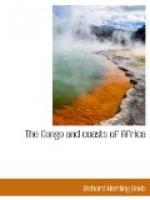I knew I had left the West Coast when, the very night we sailed from Sierra Leone, for greater comfort, I reached for a linen bed-spread that during four stifling, reeking weeks had lain undisturbed at the foot of the berth. During that time I had hated it as a monstrous thing; as something as hot and heavy as a red flannel blanket, as a buffalo robe. And when, on the following night, I found the wind-screen was not in the air port, and that, nevertheless, I still was alive, I knew we had passed out of reach of the Equator, and that all that followed would be as conventional as the “trippers” who joined us at the Canary Isles; and as familiar as the low, gray skies, the green, rain-soaked hills, and the complaining Channel gulls that convoyed us into Plymouth Harbor.
VII
ALONG THE EAST COAST
Were a man picked up on a flying carpet and dropped without warning into Lorenco Marquez, he might guess for a day before he could make up his mind where he was, or determine to which nation the place belonged.
If he argued from the adobe houses with red-tiled roofs and walls of cobalt blue, the palms, and the yellow custom-house, he might think he was in Santiago; the Indian merchants in velvet and gold embroideries seated in deep, dark shops which breathe out dry, pungent odors, might take him back to Bombay; the Soudanese and Egyptians in long blue night-gowns and freshly ironed fezzes would remind him of Cairo; the dwarfish Portuguese soldiers, of Madeira, Lisbon, and Madrid, and the black, bare-legged policemen in khaki with great numerals on their chests, of Benin, Sierra Leone, or Zanzibar. After he had noted these and the German, French, and English merchants in white duck, and the Dutch man-of-warsmen, who look like ship’s stewards, the French marines in coal-scuttle helmets, the British Jack-tars in their bare feet, and the native Kaffir women, each wrapped in a single, gorgeous shawl with a black baby peering from beneath her shoulder-blades, he would decide, by using the deductive methods of Sherlock Holmes, that he was in the Midway of the Chicago Fair.
Several hundred years ago Da Gama sailed into Delagoa Bay and founded the town of Lorenco Marquez, and since that time the Portuguese have always felt that it is only due to him and to themselves to remain there. They have great pride of race, and they like the fact that they possess and govern a colony. So, up to the present time, in spite of many temptations to dispose of it, they have made the ownership of Delagoa Bay an article of their national religion. But their national religion does not require of them to improve their property. And to-day it is much as it was when the sails of Da Gama’s fleet first stirred its poisonous vapors.




